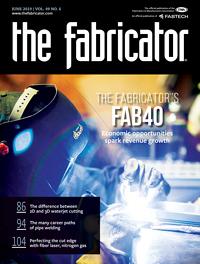Senior Editor
- FMA
- The Fabricator
- FABTECH
- Canadian Metalworking
Categories
- Additive Manufacturing
- Aluminum Welding
- Arc Welding
- Assembly and Joining
- Automation and Robotics
- Bending and Forming
- Consumables
- Cutting and Weld Prep
- Electric Vehicles
- En Español
- Finishing
- Hydroforming
- Laser Cutting
- Laser Welding
- Machining
- Manufacturing Software
- Materials Handling
- Metals/Materials
- Oxyfuel Cutting
- Plasma Cutting
- Power Tools
- Punching and Other Holemaking
- Roll Forming
- Safety
- Sawing
- Shearing
- Shop Management
- Testing and Measuring
- Tube and Pipe Fabrication
- Tube and Pipe Production
- Waterjet Cutting
Industry Directory
Webcasts
Podcasts
FAB 40
Advertise
Subscribe
Account Login
Search
Remember your best boss?
What made that boss so good?
- By Tim Heston
- June 15, 2019
- Article
- Shop Management
At every FABTECH® I attend, technology news—the latest fiber laser, press brake, robotic welding cell, integrated sheet metal automation, software—fills most of my days. But I always make time to visit the conference, particularly the management tracks.
Technology is at the core of metal fabrication. Still, a fabricator can’t thrive if it can’t find good people to operate and manage those incredible machines we see on the show floor. A machine might entice people to join a company, but if they don’t like their supervisors or senior managers, they won’t stay long—especially in an era of record-low unemployment. That’s what draws me to the management conference track at FABTECH.
Several years ago I recall walking into an in-progress session and hearing a question: “Why do most people leave their jobs?” It came from Mark Ernst, a management consultant at California-based Ernst Enterprises. Ernst, who has spoken at many FABTECH shows and other industry events, followed that question with a brief silence that got people thinking.
Sure, sometimes people jump ship for more money or a better opportunity. But as Ernst explained, money and opportunity aren’t the primary reasons people quit. They quit because they don’t like working with their boss. If managers are trained and do their jobs well, employee retention rates can skyrocket.
How many terrific managers have you had in your career? Ernst has spent years asking that question. The average is two. So what made them so great? He’s gotten enough insight that he’s writing a book on the subject (for a preview, click here), and he plans to delve deep into five common responses:
1. My terrific manager operated with integrity. They told the truth, even if people didn’t want to hear it.
2. My terrific manager was a subject-matter expert.
3. My terrific manager coached, developed, and mentored me. They seemed to see more in me than I knew I had, and they encouraged me to take on more responsibility. They gave me positive and constructive feedback. In short, they cared about me.
4. My terrific manager didn’t micromanage me. They trusted me, even allowing me to make mistakes if it helped me learn.
5. My terrific manager dealt with slackers. They addressed performance and behavioral issues quickly.
The first point, about integrity, is the foundation. Someone might be the best welding engineer on the planet. He or she could even be a good coach and have a great managerial style. But if that person lies or can’t be trusted, all that managerial finesse is a façade waiting to crumble.
The second point, being a subject-matter expert, essentially means that the manager is competent. As Ernst has discussed in his seminars, good managers needn’t be a walking encyclopedia of metal fabrication knowledge, but they should know what’s going on, and they should know whom to call or where to go if they need to know more. It’s tough to manage effectively from a place of total ignorance.
The third point is no surprise. Good managers are good coaches. In a preview of his book, Ernst described good mentors this way: “They encouraged me to take on more responsibility. They would correct me when I needed guidance, and they were quick to point out what I did well. They recognized and appreciated my efforts. They respected all the members of the team and didn’t play favorites.”
After I heard the last two points—no micromanaging and dealing with slackers—my mind immediately went to a conversation I had with a welder. I had known him for several years, so after bumping into him at FABTECH, we chatted for a few minutes to catch up. He had recently started at a new company—for less pay.
Why did he leave is previous gig? Well, the family business was passed on to the next generation, and the new owner lacked people skills in a big way. He installed cameras in every weld booth and took the classic my-way-or-the-highway approach to management. Then there was the favoritism. People who just mailed it in were rewarded, while those who worked hard and had fresh ideas weren’t. Loyalty, tenure, and one’s relationship to the family were more important than merit.
So when does “managing” become “micromanaging,” and when and how does an employee become a slacker? Established processes—developed and improved upon to better a fabricator’s competitiveness—provide the benchmarks.
Consider the bending operation. I’ve seen highly productive press brake departments run with operators working together to schedule and sequence work on their own. They’re simply given a list of jobs that need to be complete by the end of the shift (or by their first break, by lunchtime, or another time period). I’ve also seen bending departments where operators run jobs in a carefully controlled sequence. Some places look like airports, with overhead screens showing which jobs are where.
I’ve witnessed happy employees at both kinds of operations. Why? They’re probably not micromanaged, and everyone abides by an established process that works for the company. And if that process doesn’t work, employees understand why and work with their bosses to make things better. Change isn’t just handed down from on high. Those established processes also provide clear benchmarks for expectations; so if a slacker’s performance or behavior doesn’t meet those expectations, a manager can take swift action.
However formal or informal they might be, agreed-upon processes seem to be at least one key ingredient for effective management. Without them, chaos reigns, people micromanage, the firefighting ensues—and in the current job market, staff turnover rears its ugly head.
Ernst Enterprises LLC, www.ernstenterprisesllc.com
About the Author

Tim Heston
2135 Point Blvd
Elgin, IL 60123
815-381-1314
Tim Heston, The Fabricator's senior editor, has covered the metal fabrication industry since 1998, starting his career at the American Welding Society's Welding Journal. Since then he has covered the full range of metal fabrication processes, from stamping, bending, and cutting to grinding and polishing. He joined The Fabricator's staff in October 2007.
subscribe now

The Fabricator is North America's leading magazine for the metal forming and fabricating industry. The magazine delivers the news, technical articles, and case histories that enable fabricators to do their jobs more efficiently. The Fabricator has served the industry since 1970.
start your free subscription- Stay connected from anywhere

Easily access valuable industry resources now with full access to the digital edition of The Fabricator.

Easily access valuable industry resources now with full access to the digital edition of The Welder.

Easily access valuable industry resources now with full access to the digital edition of The Tube and Pipe Journal.
- Podcasting
- Podcast:
- The Fabricator Podcast
- Published:
- 04/16/2024
- Running Time:
- 63:29
In this episode of The Fabricator Podcast, Caleb Chamberlain, co-founder and CEO of OSH Cut, discusses his company’s...
- Trending Articles
Tips for creating sheet metal tubes with perforations

JM Steel triples capacity for solar energy projects at Pennsylvania facility

Are two heads better than one in fiber laser cutting?

Supporting the metal fabricating industry through FMA

Omco Solar opens second Alabama manufacturing facility

- Industry Events
16th Annual Safety Conference
- April 30 - May 1, 2024
- Elgin,
Pipe and Tube Conference
- May 21 - 22, 2024
- Omaha, NE
World-Class Roll Forming Workshop
- June 5 - 6, 2024
- Louisville, KY
Advanced Laser Application Workshop
- June 25 - 27, 2024
- Novi, MI



























